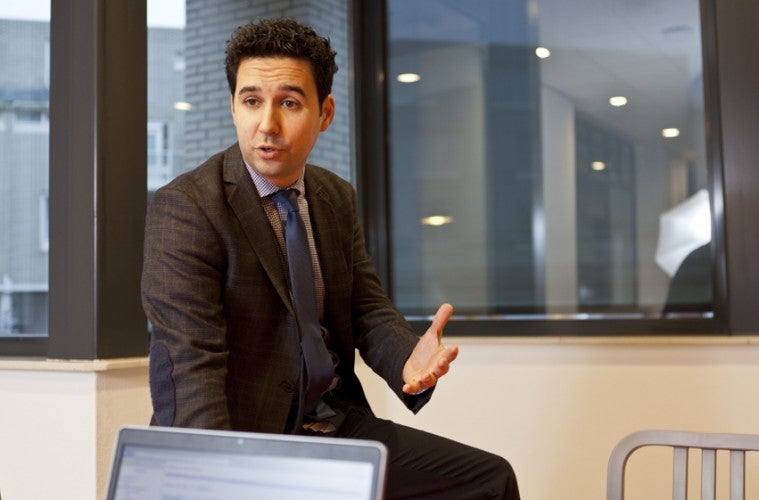Imad Moukaddim leads juvenile probation workers who are responsible for around 300 young offenders. ‘In my work, I apply exactly what I learned during my studies: how to stop criminal behaviour.’
What kind of work do you do? “At the William Schrikker Groep (WSG) I am the manager in charge of juvenile reintegration. WSG is for young people with a mild intellectual disability or chronic illness who come into contact with the criminal justice system. We offer juvenile protection, juvenile probation and foster care. If serious behavioural problems occur at home, we can provide help and advice.”
What do you have to be able to do to perform your job? “You have to know which factors play a role in criminal behaviour, but also which interventions can reduce – or even stop – that behaviour. My studies have come in really handy, because I learned how criminal behaviour begins and how it develops. And more importantly: how you can stop it. My job is a direct application of the theory in practice!”
“I work with people who have problems. They are very emotional, and often react based on those emotions. So you have to deal with angry clients and emotional parents. Sometimes they take those emotions out on you verbally, so you have to be able to deal with that.”
“I have to deal with angry clients and emotional parents”
What does your job title entail? “I am responsible for all of the probation cases in the province of North Holland. I lead 16 juvenile probation workers who are responsible for around 300 young offenders. You have to be available around the clock. I analyse new cases, and I discuss the current cases with the professionals. In order to keep recidivism under control, we choose suitable interventions, such as multi-system therapy: we contact the adolescent, their parents, other family members, school, friends, work, internships, etc. We also have weekly face-to-face contact. I also advise the court on suitable sentences, and I review and approve the action plans that we draw up for each client.”
What is your average work day like? “Every morning, I see which plans I have to review and approve. Right now, for example, I’m mainly busy with the projects Top600 and Top25 for Amsterdam and Haarlem. I have a lot of contact with the chain partners – at least 40 organisations such as the Ministry of Justice, the police and the municipal health service. And I also have the usual management duties: discussing cases and leading meetings, calling juvenile probation workers to make appointments, and meeting with colleagues and other parties involved in law enforcement. Oh yeah, I also give aggression control training courses to juvenile delinquents. That’s a training order issued by the juvenile court.”
Aggression control training? “I have to deal with several different types of young people. Some will accept the training order, but some won’t. But you still have to complete the training, even if you don’t want to. The funny thing is: I have the best ‘click’ with the young person who offered the most resistance – ‘You’ll never change my behaviour. I’m only here because otherwise I’d have to go to jail for two weeks.’ As is often the case, the young people with the biggest mouths have the softest hearts!”
You are in a leadership position. Did you learn that in your studies as well? “No, leading professionals is something completely different. I took a number of training courses to learn that. One big advantage is that I have worked as a juvenile probation worker myself.”
“The funny thing is: I have the best ‘click’ with the young person who offered the most resistance”
What do you enjoy most about your job? “The actual work: I can apply almost everything I learned during my Criminology studies in practice. Especially what I learned in my Master’s in Life Course Criminology. I have always been fascinated as to why people display certain criminal behaviour.”
And what do you not like about it? “That’s a difficult question. But if I have to mention something, it would be the complaint meetings with clients, parents or chain partners. It’s impossible to keep everyone satisfied in this job. Those meetings aren’t very common, but I prefer to give them to someone else.”
What did you think about your Life Course Criminology Master’s programme? “I enjoyed doing the Master. I was allowed to choose four out of the seven courses myself. But it was difficult to come up with a subject for my Master’s thesis. In the end, I studied Moroccan youths with mild intellectual disabilities and criminal behaviour in Amsterdam. I compared their criminal behaviour with that of young people who did not have intellectual disabilities. It turns out that Moroccans with a disability are twice as likely to come into contact with the criminal justice system, and do so a year earlier, than other young people. My research was published in the book Beperkt in de keten, mensen met een licht verstandelijke beperking in de strafrechtsketen (Disabled in the Chain; People with a Mild Intellectual Disability in the Criminal Justice Chain). I’m really proud of that!”
Do you have any tips for new Criminology students? “Try to do your graduate research with an organisation. That will give you an introduction to the field, and you can start building your network. If you show your talents and work hard, then there is a good chance that they will ask you to stay on after graduation. Try to get good grades too, as that will make you stand out and increase your chances in the job market. Do an internship or look for a job where you can gain work experience. That will give you more experience, and it will help to build your network.
CV BLOK






